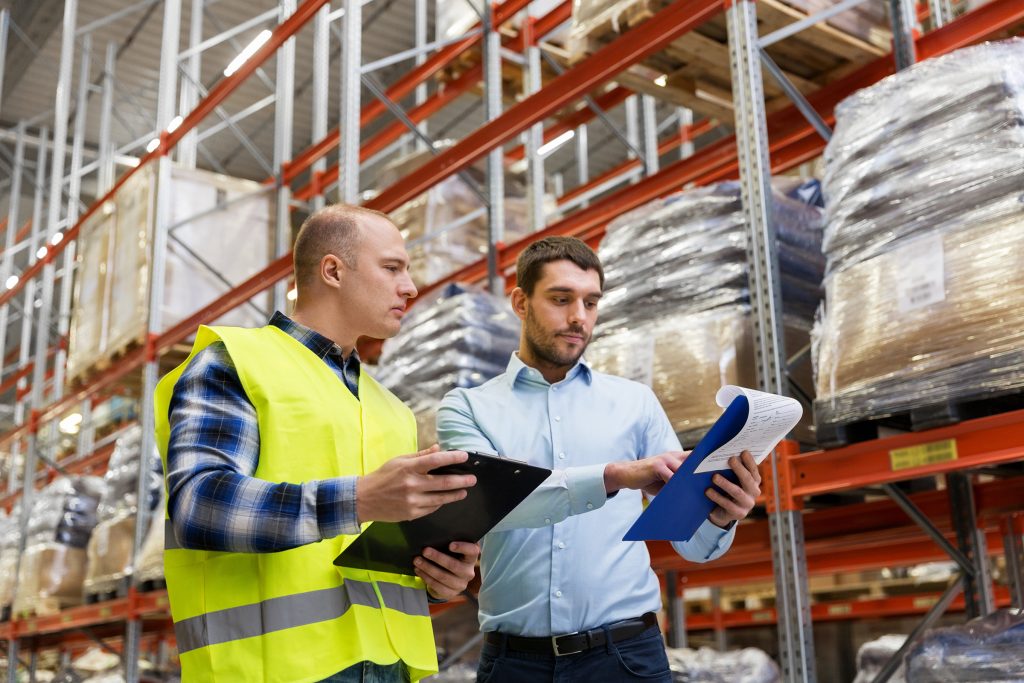You order a camera lens from China and it arrives at your home in New York, in less than a month. How does this happen?
Trade networks today have the capability of transporting goods around the world at rapid speeds. What makes this possible are logistics carriers and carrier networks.
For a camera lens to make its way from China to the United States there needs to be someone handling its transport. A company or person who is in charge of this transportation is a logistics carrier.
A logistics carrier will then be legally responsible for carrying the camera lens during the shipping process.
These carriers are also called freight carriers and can provide multi-modal transport services to get goods delivered faster. This means they can transport by land, air, and sea to reduce costs or transport special freight.
Logistics carriers work in two distinct ways. Some logistics carriers are common carriers or transporters for any individual entity or company.
Other logistics carriers are contract carriers. These companies and transport providers are bound to carry goods for certain shippers across a set time period. Contract carriers draw up agreements with particular companies and in doing so, cannot carry goods for other businesses.
Chances are that your camera lens made its way to you via a contract, common carrier, or even both depending on the shipping contracts and arrangements of the supplier.

Logistics carriers work through a complex network to get products like camera lenses from their point of origin to their destination. It all starts when a business or shipper tenders an order with a 3PL freight broker. The shipper will need to mention all the details about the order shipments. These shipments can be scheduled on a regular basis or in special circumstances.
After an order is tendered, the 3PL company then schedules and organizes delivery information in their transportation management system. The 3PL freight broker will engage with a large network of logistics carriers to get these orders delivered in a certain timeline.
The logistics carriers will need to work with insurance, hazard risks, handling requirements, and time management for all the orders. The order can only be dispatched once all these details have been checked.
The dispatch comes after these checks and the order is handed over to the carrier. The packages will then be loaded onto freight trailers or transport vehicles. The carrier will need to sign a shipper’s Bill of Lading (BOL). They assume responsibility for the package and are fully liable for problems in the delivery.
At this point, the carrier will then be in transit. In a well-connected carrier network, the freight broker will be in touch with the carrier throughout the journey.
After this comes the unloading, when the consignee will receive the package and sign the Bill of Lading. The 3PL will then receive Proof of Delivery documents and invoices for billing.
Companies base their pricing model for full truckload on a per-mile basis. The farther you travel, the more expensive it will be. Extra charges, accessorials charges, are quoted independently of the per-mile rate. Doing so allows freight forecasters to weigh the benefits of multiple lanes to see what rate is best. Another thing to note about per-mile full truckload rates is that deadhead miles, which are “empty miles” when a driver needs to get back after making a delivery, are often included in the rate. So, to break it down. The rates include miles from delivering the shipment and the miles it takes for a driver to return.
Less-than-truckload (LTL), on the other hand, follows a different pricing structure. It depends on a hundred-weight and volume, and it is not as straightforward as a full truckload. This change is because LTL transports goods from multiple shippers, so there is much more involved. Full truckload deals with one shipper, while LTL deals with many shippers, meaning many inputs. Volume, Class, Commodity type, and weight all factor into these inputs.
Next up, we have air freight – companies price air freight per kilogram. Air carriers will charge in two ways: volumetric weight (dimensional weight) or actual weight. Whatever is more expensive of the two is what they will charge. Do keep in mind that each freight forwarder operates slightly differently from one another.
If you choose to move freight via rail container, they operate most similarly to truckload shippers, charging on a per-mile basis. In addition to transit costs, it is also essential to consider the cost of railcar equipment when using rail or multi-modal transit.
Ocean shipping is different from other modes of shipping in that the pricing model is per day. The average price worldwide has steadily increased year to year.
Now that you have a grasp of how carrier networks work, you might be wondering—should all businesses join a carrier network?
The short answer is: yes. They should join a carrier network with a 3PL and expert carrier services. Here’s why:
There are a lot of things that can go wrong during shipments. The weather can be volatile, the trucks can breakdown in the middle of their routes, or unanticipated checkpoints or delays could pop up at the last minute. If you have a business and join a carrier network, these will not be your headaches. A 3PL will take care of all the scheduling, planning, and re-booking in case anything goes wrong.


A 3PL provider will update progress and track communication between the carriers, suppliers, and customers to make the delivery and transport more efficient.
The carriers connected to the 3PLs will keep in touch via phone or GPS to track progress along the way. If they encounter a problem on the road, the 3PL will know immediately and send help for the current carrier or replace it with another one.
Happy customers should be the primary goal of your services. Hiring a reliable logistics provider should be responsible for that. The client retention rate will increase when carriers stick to their estimated pick-up and delivery timeframes and communicate well with customers throughout the shipment process.


Perhaps one of the best benefits of having a stellar logistics provider is that they can save you money in the end. They can work with their clients to develop an effective dollar-saving strategy, like consolidation programs, network reconfiguration, and efficiency improvements. Whether you combine those or look at them individually, they can reduce costs substantially.
A logistics carrier can adequately assess whether certain carriers meet their specific client’s needs. This assessment can be an overly time-consuming task, but a professional logistics carrier will take care of that. They already have an existing web of carriers they work with and may have insight specific to the needs of an organization that wouldn’t be available otherwise.

TMS systems manage carriers and optimize carrier route automation and are increasingly popular, which makes sense. Many technological tools require organization and management in one commonplace. It helps track delivery drivers in real-time, lowering freight expenses, increasing transparency, and improving overall customer satisfaction scores.
Advancements in actual transportation affect carrier networks, and as we have seen a rise in self-driving automobiles, we see a rise in the same for logistics. A few years back, only very well-to-do companies could make this a reality but looking ahead to the future, it may be feasible for all.
Believe it or not, companies use drones to expedite shipping. Drones allow shipment companies to reach remote locations far easier and quicker than traditional modes of transportation. This advancement has generated quite a buzz in the industry and will likely see an uptick in the coming years.
When it comes to skills that a logistics carrier must possess, teamwork is at the top. Collaboration and communication within your team across many different departments guarantee that projects are always on track. When speed and quality are essential aspects of the business, working harmoniously together is crucial.
The end destination, and the client that comes along with that, is always what logistics companies see as most important. Managing customer relationships and improving upon them is a goal that companies are always after.
As would probably be assumed, logistics companies are incredibly organized. It is essential to the business. Planning, scheduling, and delivering goods on time is a skill and paramount for any logistics company.
A 3PL, a carrier, and a supplier, all collaborate to get your camera lens from China to the United States. Without them, your camera lens would still be at the factory. Logistics Carrier Networks are then essential for every good you consume.
Input your search keywords and press Enter.
Along with our other available capabilities, R2 also offers your business intermodal services. If you would like to utilize this service or explore its options, our experienced staff can assist you in taking advantage of its possibilities. Let us help you find the most efficient and manageable cost for your shipment.
Intermodal Freight Benefits
– R2 associates are on hand 24/7 to assist in any matter
– We can accommodate cost effective solutions for any number of loads you may have
– Watch your shipment move from Point A to Point B online
– Multimodal transition is done seamlessly as your needs alter
– A contracted capacity with the ability to move your freight in the U.S., Canada, and Mexico
As supply chain complexity is in constant evolution, ingenuity is vital for gaining a competitive edge. Our expert associates provide the ability to appraise your logistics network to expand and apply more cost effective and service oriented solutions. Do you have just one requirement or several? The R2 team is only a phone call away to help position your company above the competition
R2’s Managed Transportation Program Includes:
– Collaboration – your business is our business. We will aid in the arrangement of meeting your supply chain demands with corporate guidelines
– Evaluation of your distribution system and design of the most cost effective network
– Providing transportation direction to bring control to your shipping budget and improving response time
With R2 Logistics’ excess of contracted carriers, the options are endless to find the right solution to move your freight. We also understand that getting it moved isn’t your only concern. That’s why it’s our first priority to choose the right option for you.
After the selection has been made we begin the process of following the freight from start to finish. At least 5 check calls are made for each shipment to ensure its security, and if you ever have a question, we’ll have an answer.
Truckload Freight Benefits
– We’re committed to you and your business – we’re available 24/7
– We set you up with your ONE and ONLY account representative
– We are not bound by U.S. borders – we make it easy for you to move shipments to and from Mexico and Canada
– Follow your shipments quickly and easily online
– Countless options – whether it’s for one load or for your entire supply chain, R2 has the solution you’re seeking
Knowing when to use Less Than Truckload shipments increases productivity, reduces freight spend, and streamlines freight shipping. LTL is ideal when freight doesn’t require the use of an entire trailer and weighs between 150 and 15,000 pounds.
Our relationships with the nation’s leading LTL carriers, allows R2 to pass our rates to our customers. Beyond our competitive rates, we have simplified the LTL shipping process with our innovative and game-changing Transportation Management System.
Using our TMS, shippers can realize the rewards from the moment they log on. With R2’s cloud-based TMS, shippers have access to real-time pricing, capacity across multiple carriers, and actionable reporting analysis.
LTL Freight Benefits with R29
– Analyze your logistics network and improve its current state
– Competitive rates pre-negotiated with our network of LTL carriers
– Ability to instantly quote, book, track and manage all shipments with R2 TMS
– A dedicated LTL freight expert to help with any of your freight questions
– Consolidated invoicing for all your shipments
– Unparalleled reporting capabilities making performance and cost analysis simpler than ever
We can understand that there’s never enough time in the day. If you have a shipment that should have been moved 24 hours ago we have the means of getting it there now. We have a multitude of contracted expedited and air freight carriers who can move your freight for you in a safe and reliable fashion. Let us do the work for you. We will track the shipment and let you know when it has arrived at its destination.
Expedited and Air Freight Benefits
– Dedicated dispatch and freight management from all R2 associates
– Extra precaution and 24/7 supervision for sensitive shipments
– ONE point of contact to answer any and every need you may have
– Customized options allowing you to utilize the best combination of service and value
– Accessibility to a surplus of different vehicle or trailer types as well as single and team driver
With a wide range of Ocean Freight services covering multiple equipment types and consolidation services, we ensure your cargo reaches its destination in the most cost-efficient manner. Our long-term relationships with ocean carriers allows R2 Logistics to provide both Less-Than-Container Load (LCL) and Full-Container Load (FCL) shipments. Our in-house team of international freight specialists manage your freight and also offer customs clearance and tariff classification.
R2’s Ocean Shipping Benefits
– Competitive rates pre-negotiated with our network of ocean carriers
– Use FCL shipping for valuable cargo that you wouldn’t want with another person’s shipment. FCL is also a good option if you need to ship loads of 12+ pallets
– LCL shipping means you share container space with other cargo. This can be a more cost-effective option for shipping smaller loads overseas.
– The ease of working with one company for all your logistics needs—including ocean, air, customs brokerage, trade compliance, and surface transportation
Simply put, Reverse Logistics is the return of products to a manufacturer or distributor from their customer. A well-organized Reverse Logistics program will result in direct benefits such as improved customer satisfaction and reductions in warehousing and distribution costs. Studies show 8-9% of all customer shipments are returned and 25-30% of e-retail shipments are as well. Managing Reverse Logistics costs are critical to running an efficient Supply Chain.
RA Numbers & Accounting
RA numbers are captured in the R2 TMS and linked with BOL numbers and Carrier PRO numbers resolving accounting issues due to missing RA numbers.
Damage & Recouping
Strong relationships with R2’s network of LTL carriers ensures shipments are handled with care.
Cost
The R2 TMS will select the most effective carrier for both transit time and cost. Customers are no longer held “hostage” with only one carrier choice.
When you’re hauling a shipment that’s oversized and overweight, attention to detail is crucial. The attention needed is exactly what you will receive with R2. With our vast network of nationwide carriers we can solve the problems you may face with your specialized shipment. Safety always plays a major role in any shipment moved under our watchful eyes. This makes us the easy choice for your next shipment requiring special handling.
Flatbed & Specialized Freight Benefits
– 24/7 dispatch supervision from start to finish
– Guaranteed certified and insured carriers used for every load
– ONE account executive available for any assistance needed
– Online tracking and document retrieval capability
– Shipping solutions designed to meet your unique needs